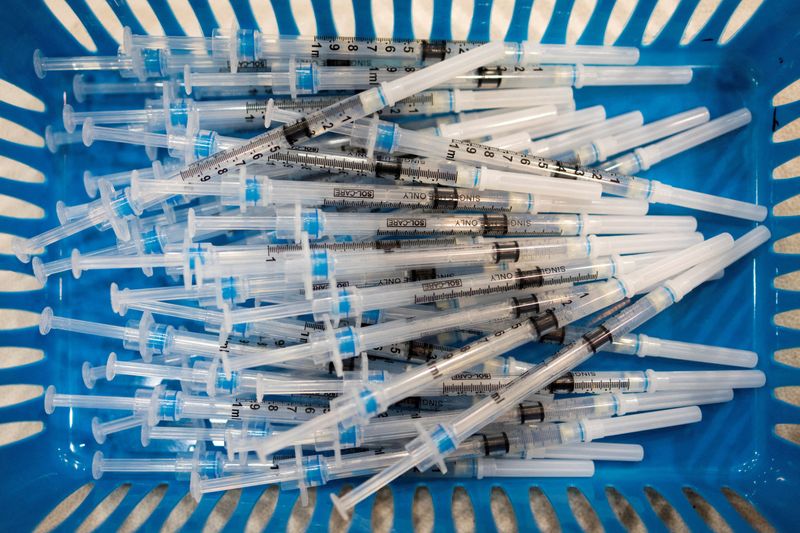By Julie Steenhuysen
CHICAGO (Reuters) - The U.S. Food and Drug Administration has authorized updated COVID-19 boosters from Pfizer Inc (NYSE:PFE) with German partner BioNTech SE (NASDAQ:BNTX) and Moderna (NASDAQ:MRNA) Inc retooled to target Omicron BA.4 and BA.5 subvariants as well as the original virus.
They could start rolling out in the next few days following recommendations from the U.S. Centers for Disease Control and Prevention (CDC), which is holding a meeting of its expert advisers on Thursday. Here is what you need to know:
WHO SHOULD GET AN UPDATED BOOSTER?
All people age 12 and older who have gotten the original two-dose vaccine and who are at least two months out from a booster shot will be eligible. The Pfizer vaccine is authorized for people 12 and older, while Moderna's is for those 18 and older.
Government health officials say the boosters are needed because immunity wanes over time and the vaccines help prevent serious disease and death. They also say younger people can benefit because officials believe the new shots can help prevent long COVID, which can involve a wide array of debilitating symptoms than can linger for months.
Several experts said they do not expect the updated vaccines to be game changing and urged public health officials not to overstate their benefits.
Dr. William Schaffner, an infectious disease expert at Vanderbilt University Medical Center and an adviser to the CDC, said the agency's recommendations should inform decisions on who exactly should get the shots.
WHAT IF I RECENTLY HAD COVID OR A BOOSTER?
While the FDA said the updated vaccines should be given at least two months after a prior booster shot, or infection, many vaccine experts have said they believe that interval is too short a period between doses.
"It should have been at least four months, and many immunologists I think would be happier if it was six," said John Moore, a professor of microbiology and immunology at Weill Cornell Medical College in New York.
He said boosting restores antibody levels to where they were after a person's most recent encounter with the virus - either via vaccine or infection.
If antibody levels are relatively high when a person gets another booster, they could even interfere with the effect of the booster, he said.
WHAT DOES THE DATA SAY?
The FDA said its decision making relied on data from human trials of so-called bivalent vaccines that incorporated the first version of the coronavirus as well as prior variants, including the BA.1 Omicron variant that was dominant this past winter.
Pfizer and Moderna also presented data on the BA.4/BA.5 boosters from studies in labs and animals.
Because the vaccine is better matched to the BA.5 subvariant of the virus that is still widely circulating, it could be more successful at preventing infections than the ones just targeting the original virus.

"That is on the wish list, but we don't know if that will be actualized," said Dr Eric Topol, a genomics expert and director of the Scripps Research Translational Institute in La Jolla, California.
He said the updated shots will likely be effective against BA.4.6, a newer subvariant of Omicron that is on the rise in the United States.